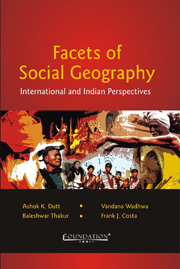Book contents
- Frontmatter
- Contents
- Foreword
- Preface
- Acknowledgements
- List of Contributors
- I Introductory Framework: Allen G. Noble's Contribution to Social Geography
- II Conceptual and Theoretical Basis of Social Geography
- 4 Social Geography: History, Structure and Reflections, with Special Reference to India
- 5 Methodological Developments in Social Geography
- 6 Geographies of Disability: An Emergent Theme in Social Geography
- 7 Geography and Personality of Region: The Context of Culture
- 8 Social Planning: A Spatial Perspective
- III Social Geography from a Global Perspective
- IV Social Geography in the Indian Context
- V Indian Social Geography: City and State Context
- Index
4 - Social Geography: History, Structure and Reflections, with Special Reference to India
from II - Conceptual and Theoretical Basis of Social Geography
Published online by Cambridge University Press: 05 June 2012
- Frontmatter
- Contents
- Foreword
- Preface
- Acknowledgements
- List of Contributors
- I Introductory Framework: Allen G. Noble's Contribution to Social Geography
- II Conceptual and Theoretical Basis of Social Geography
- 4 Social Geography: History, Structure and Reflections, with Special Reference to India
- 5 Methodological Developments in Social Geography
- 6 Geographies of Disability: An Emergent Theme in Social Geography
- 7 Geography and Personality of Region: The Context of Culture
- 8 Social Planning: A Spatial Perspective
- III Social Geography from a Global Perspective
- IV Social Geography in the Indian Context
- V Indian Social Geography: City and State Context
- Index
Summary
The field of social geography is inherent to the study of societies, their way of life, customs and traditions. The historical dispersal of social geography has undergone change through many different stages due to new scientific development. Explorations of various time periods had great bearing on the exposition of routes, civilizations, and economics of lands and people, which brought the societies to limelight and established contemporary trends. In geography, the contributions of Vidal de la Blache (1845–1918) paved a distinctive role to relate the qualities of environment to societies, and Jean Brunhes (1869–1930) emphasized the assessment of communities by their background and economic resources. The contributions of de la Blache and Brunhes, along with those who followed their lead, initiated a particular study of causative social geography throughout the world. Their studies were actually related to human adjustments to climate, physical bases, transports, economic activities, houses, dwellings and cultivation of environment. Before World War II, the scope and objectives in the study of social geography were confined to physical geographic influences on human societies. As far as the American and the European views on the structure of social geography are concerned, the ideas of Hartshorne and Houston respectively are the most characteristic and parallel in alignment as noted below. Their ideas, in a way, satisfied universal appeal. Thus, this chapter is centred on these parameters with reference to important literature on their subject.
- Type
- Chapter
- Information
- Facets of Social GeographyInternational and Indian Perspectives, pp. 49 - 64Publisher: Foundation BooksPrint publication year: 2012



